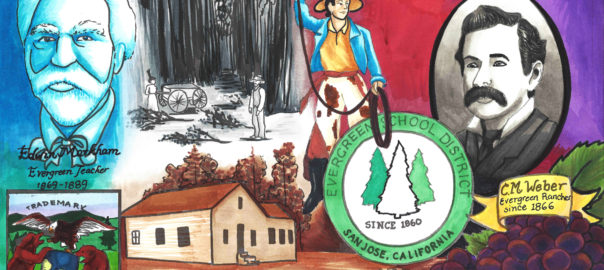Charles Edward Anson 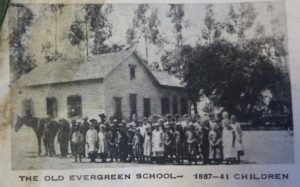 Markham (1852-1940) is characterized as a minor American poet. Since he has Evergreen roots, we’ll designate him a major Evergreen poet. Edwin Markham was a teacher at the Evergreen Schoolhouse from 1869-1889. During those twenty years, he would write from the East Foothills and inspire and educate students from the Chaboya family, Kettmann family, Smith Family, certainly one day principal and superintendent, Katie R. Smith, Aborn Family , Chew Family and others. He was so cherished by the community, a redwood tree would be planted in his honor.
Markham (1852-1940) is characterized as a minor American poet. Since he has Evergreen roots, we’ll designate him a major Evergreen poet. Edwin Markham was a teacher at the Evergreen Schoolhouse from 1869-1889. During those twenty years, he would write from the East Foothills and inspire and educate students from the Chaboya family, Kettmann family, Smith Family, certainly one day principal and superintendent, Katie R. Smith, Aborn Family , Chew Family and others. He was so cherished by the community, a redwood tree would be planted in his honor.
 Markham (1852-1940) is characterized as a minor American poet. Since he has Evergreen roots, we’ll designate him a major Evergreen poet. Edwin Markham was a teacher at the Evergreen Schoolhouse from 1869-1889. During those twenty years, he would write from the East Foothills and inspire and educate students from the Chaboya family, Kettmann family, Smith Family, certainly one day principal and superintendent, Katie R. Smith, Aborn Family , Chew Family and others. He was so cherished by the community, a redwood tree would be planted in his honor.
Markham (1852-1940) is characterized as a minor American poet. Since he has Evergreen roots, we’ll designate him a major Evergreen poet. Edwin Markham was a teacher at the Evergreen Schoolhouse from 1869-1889. During those twenty years, he would write from the East Foothills and inspire and educate students from the Chaboya family, Kettmann family, Smith Family, certainly one day principal and superintendent, Katie R. Smith, Aborn Family , Chew Family and others. He was so cherished by the community, a redwood tree would be planted in his honor.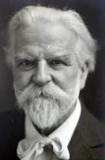 Though not published until 1899, ten years after Edwin Markham left the employment of the Evergreen School, I like to speculate about his inspirations. The Oregon native wrote poetry about the working class life in the late 1800’s. He would’ve worked on the family farm as a child, like most children at the time, in the north bay area. He would finish his teaching credential at San Jose State, then known as the Normal School, and fall in love with Evergreen. From 1921-1931, Edwin Markham would be Poet Laureate of Oregon.
Though not published until 1899, ten years after Edwin Markham left the employment of the Evergreen School, I like to speculate about his inspirations. The Oregon native wrote poetry about the working class life in the late 1800’s. He would’ve worked on the family farm as a child, like most children at the time, in the north bay area. He would finish his teaching credential at San Jose State, then known as the Normal School, and fall in love with Evergreen. From 1921-1931, Edwin Markham would be Poet Laureate of Oregon.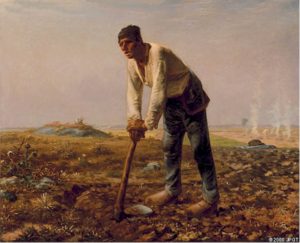 Edwin Markham incites emotion through his metaphors and that familiar sense of earning. It is often said that Markham’s “The Man with the Hoe” was inspired by Jean-Francios Millet’s painting of the same subject, shown here to the left. That may have been a contemporary pop culture influence, however, Markham would get to see this activity quite regularly during his twenty year teaching stint in the town of Evergreen.
Edwin Markham incites emotion through his metaphors and that familiar sense of earning. It is often said that Markham’s “The Man with the Hoe” was inspired by Jean-Francios Millet’s painting of the same subject, shown here to the left. That may have been a contemporary pop culture influence, however, Markham would get to see this activity quite regularly during his twenty year teaching stint in the town of Evergreen.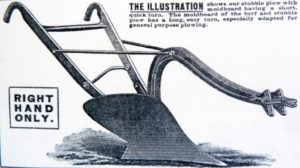 I have specific details about the farm adjacent to the schoolhouse using hoes, pitchforks and sickles, archaic equipment the immigrant family would’ve used in the old country. The farmers in Evergreen during this time would have front row seats to the Industrial Revolution and watch their equipment mechanize before their own eyes. Poorer farmers would have to work by hand until Evergreen’s labor force combined and circulated large rigs to harvest everyone’s fields.
I have specific details about the farm adjacent to the schoolhouse using hoes, pitchforks and sickles, archaic equipment the immigrant family would’ve used in the old country. The farmers in Evergreen during this time would have front row seats to the Industrial Revolution and watch their equipment mechanize before their own eyes. Poorer farmers would have to work by hand until Evergreen’s labor force combined and circulated large rigs to harvest everyone’s fields.Markham’s poetry would very much parallel the hardworking farmer’s plight during this time in history. Evergreen was farm country, first appearing in the Altas in 1867. Markham would move into Evergreen in 1869, as one time squatters became legal land owners and brand new farms were being raised all over town. It would be harder to imagine Markham’s work not being inspired by his time in the little farming town 8 miles outside the City.
Here’s Markham’s poem. If you enjoy this, read on. His poetry is quite lovely.
The Man with the Hoe
Bowed by the weight of centuries he leans Upon his hoe and gazes on the ground, The emptiness of ages in his face, And on his back the burden of the world. Who made him dead to rapture and despair, A thing that grieves not and that never hopes. Stolid and stunned, a brother to the ox? Who loosened and let down this brutal jaw? Whose was the hand that slanted back this brow? Whose breath blew out the light within this brain? Is this the Thing the Lord God made and gave To have dominion over sea and land; To trace the stars and search the heavens for power; To feel the passion of Eternity? Is this the Dream He dreamed who shaped the suns And marked their ways upon the ancient deep? Down all the stretch of Hell to its last gulf There is no shape more terrible than this — More tongued with censure of the world’s blind greed — More filled with signs and portents for the soul — More fraught with menace to the universe. What gulfs between him and the seraphim! Slave of the wheel of labor, what to him Are Plato and the swing of Pleiades? What the long reaches of the peaks of song, The rift of dawn, the reddening of the rose? Through this dread shape the suffering ages look; Time’s tragedy is in the aching stoop; Through this dread shape humanity betrayed, Plundered, profaned, and disinherited, Cries protest to the Powers that made the world. A protest that is also a prophecy. O masters, lords and rulers in all lands, Is this the handiwork you give to God, This monstrous thing distorted and soul-quenched? How will you ever straighten up this shape; Touch it again with immortality; Give back the upward looking and the light; Rebuild in it the music and the dream, Make right the immemorial infamies, Perfidious wrongs, immedicable woes? O masters, lords and rulers in all lands How will the Future reckon with this Man? How answer his brute question in that hour When whirlwinds of rebellion shake all shores? How will it be with kingdoms and with kings — With those who shaped him to the thing he is — When this dumb Terror shall rise to judge the world. After the silence of the centuries?
